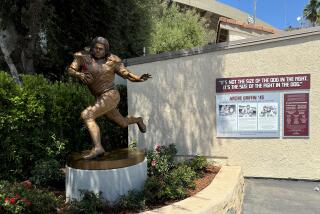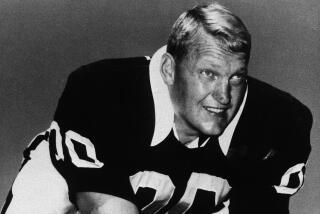Otto Graham, 82; Quarterback Led Cleveland Browns to 7 Titles
- Share via
Otto Graham, the Cleveland Browns quarterback known as “Automatic Otto” because in 10 years he never missed a game -- nor did his team miss a championship game -- died Wednesday at 82 in Sarasota, Fla.
Graham, who had been diagnosed with Alzheimer’s disease in 2001, was taken to Sarasota Memorial Hospital early Wednesday with a heart condition.
Paul Brown, who founded and coached the Cleveland team and selected Graham as his offensive leader, once said, “The test of a quarterback is where his team finishes. By that standard, Otto Graham was the best of all time.”
Yet Graham wasn’t always a star football player. He went to Northwestern University in the early 1940s on a basketball scholarship. The only football he played was in intramural competition.
By chance, Northwestern Coach Lynn “Pappy” Waldorf saw Graham throwing passes and decided that he was good enough for the varsity. Graham joined the team as a sophomore and immediately became the starting tailback.
By the following season, he was putting his name in the Big Ten record book by completing 89 of 182 passes for 1,092 yards -- big numbers in an era when football teams generally ran the ball more than they passed it.
Despite his success, Graham wasn’t about to leave the hardwood floor that had lured him to Northwestern. As a senior, he was an All-American in both football and basketball.
After graduating in the midst of World War II, Graham spent the next two years in the Navy.
When he was discharged, Graham, the son of music teachers, returned to football as a professional, not in the National Football League but in a newly created rival league, the All-America Football Conference. Brown put him at the controls of his T-formation, having earlier watched Graham upset his Ohio State team twice.
“I guess I had impressed him,” Graham said.
With Graham at the controls, Cleveland won all four championships of the new league, winning 52 of 56 games.
In 1950, the struggling league was disbanded; the NFL absorbed the Browns along with the Baltimore Colts and San Francisco 49ers.
Those who had doubted Graham’s ability attributed his success to playing in an inferior league. Surely, skeptics said, he wouldn’t be able to match his previous accomplishments in the powerful NFL.
They were wrong. His first NFL pass, against the Philadelphia Eagles, went for a touchdown. His first game, naturally, was a win.
And when the 1950 championship game was played, Graham led his Browns onto the field in Cleveland to face the Los Angeles Rams. He threw four touchdown passes to lead his team to a 30-28 victory.
A year later, the two teams met again for the NFL championship, this time in the L.A. Coliseum. And this time -- for the first time as a pro -- Graham lost, the Rams prevailing, 24-17, for their only championship in Los Angeles.
Graham led the Browns to the next four championship games as well, winning two of them. In 1954, Graham threw for three touchdowns and ran for three in a 56-10 victory over the Detroit Lions. The next year, he led the Browns past the Rams, 38-14.
That last victory came at the end of the 1955 season, which began with Graham retired. But Brown talked him into coming back for one last hurrah, and in Graham’s final game, he passed for a pair of touchdowns and ran for two more.
He was named player of the year, an award he had won two years earlier.
In his career, Graham passed for 23,584 yards and 174 touchdowns and ran for 882 yards and 44 touchdowns. In that time, the Browns won 105 games, lost 17 and tied 4.
In 1965, Graham was inducted into the Pro Football Hall of Fame, and Cleveland retired his number, 14.
Graham wasn’t through winning football games, though. He became head coach at the Coast Guard Academy in 1959, and four years later led his team to an undefeated regular season.
His string of successes finally ended when he tried coaching at the pro level. In three seasons with the Washington Redskins, beginning in 1966, Graham’s teams won 17, lost 22 and tied 3.
He returned to the Coast Guard Academy as athletic director in 1970 and remained there until retiring in 1985.
Graham is survived by his wife of 57 years, Beverly; three children, Duey, Sandy and Dave; two foster daughters; 16 grandchildren; and four great-grandchildren.
*
Times wires services contributed to this report.
More to Read
Go beyond the scoreboard
Get the latest on L.A.'s teams in the daily Sports Report newsletter.
You may occasionally receive promotional content from the Los Angeles Times.










